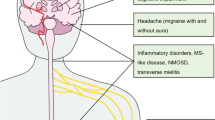Abstract
Although antiphospholipid syndrome (APS) is a multisystem prothrombotic condition, its inflammatory nature has been increasingly recognized in recent years. Stroke and transitory ischemic attacks are the neurological manifestations included in APS criteria, however many other neurological involvements have been attributed to antiphospholipid antibodies (aPL), such as seizures, transverse myelitis, and cognitive impairment. In this article we will review evidence from animal model that explain the role of aPL in cognition.

Similar content being viewed by others
References
Wilson WA, Gharavi AE, Koike T et al (1999) International consensus statement on preliminary classification criteria for definite antiphospholipid syndrome: report of an international workshop. Arthritis Rheum 42:1309–1311
Miyakis S, Lockshin MD, Atsumi T, Branch DC, Brey RL, Cervera R et al (2006) International consensus statement on an update of the classification criteria for definite antiphospholipid syndrome (APS). J Thromb Haemostasis 4:295–306
Chapman J, Rand JH, Brey RL, Levine SR, Blatt I, Khamashta MA, Shoenfeld Y (2003) Non-stroke neurological syndromes associated with antiphospholipid antibodies: evaluation of clinical and experimental studies. Lupus 12:514–517
Sanna G, Bertolaccini ML, Cuadrado MJ et al (2003) Central nervous system involvement in the antiphospholipid (Hughes) syndrome. Rheumatology 42:200–213
Tomietto P, Annese V, D'agostini S, Venturini P, La Torre G, De Vita S, Ferraccioli GF (2007) General and specific factors associated with severity of cognitive impairment in systemic lupus erythematosus. Arthritis Rheum 57:1461–1472
Mikdashi J, Handwerger B (2004) Predictors of neuropsychiatric damage in systemic lupus erythematosus: data from the Maryland lupus cohort. Rheumatology (Oxford) 43:1555–1560
McLaurin EY, Holliday SL, Williams P, Brey RL (2005) Predictors of cognitive dysfunction in patients with systemic lupus erythematosus. Neurology 64:297–303
Tektonidou MG, Varsou N, Kotoulas G, Antoniou A, Moutsopouls HM (2006) Cognitive deficits in patients with antiphospholipid syndrome: association with clinical, laboratory, and brain magnetic resonance imaging finding. Arch Int Med 166:2278–2284
Aharon-Peretz J, Brenner B, Amyel E et al (1995) Neurocgnitive dysfunction in antiphospholipid antibody syndrome (APS). Lupus 4:101
Erkan D, Kozora E, Lockshin MD (2011) Cognitive dysfunction and white matter abnormalities in antiphospholipid syndrome. Pathophysiology 18:93–102
Chapman J, Abu-Katash M, Inzelberg R et al (2002) Prevalence and clinical features of dementia associated with the antiphospholipid syndrome and circulating anticoagulants. J Neurol Sci 203–204:81–84
Levine SR, Welch KMA (1987) The spectrum of neurologic disease associated with antiphospholipid antibodies. Lupus anticoagulants and anticardiolipin antibodies. Arch Neurol 44:876–883
Liberato B, Levy RA (2007) Antiphospholipid syndrome and cognition. Clin Rev Allergy Immunol 32:188–191
Hess DC, Taormina M, Thompson J et al (1993) Cognitive and neurologic deficits in the MRL/lpr mouse: a clinicopathologic study. J Rheumatol 20:610–617
Ziporen L, Shoenfeld Y, Levy Y, Korczyn AD (1997) Neurological dysfunction and hyperactive behavior associated with antiphospholipid antibodies. A mouse model. J Clin Invest 100:613–9.10
Shoenfeld Y, Nahum A, Korczyn AD et al (2003) Neuronal-binding antibodies from patients with antiphospholipid syndrome induce cognitive deficits following intrathecal passive transfer. Lupus 12:436–442
Chapman J, Cohen-Armon M, Shoenfeld Y, Korczyn AD (1999) Antiphospholipid antibodies permeabilize and depolarize brain synaptoneurosomes. Lupus 8:127–133
Cimaz R, Meroni PL, Shoenfeld Y (2006) Epilepsy as part of systemic lupus erythematosus and systemic antiphospholipidsyndrome (Hughe’s syndrome). Lupus 15:191–197
Appenzeller S, Cendes F, Costallat LT (2004) Epileptic seizures in systemic lupus erythematosus. Neurology 63:1808–1812
Herranz MT, Rivier G, Khamashta MA, Blaser KU, Hughes GR (1994) Association between antiphospholipid antibodies and epilepsy in patients with systemic lupus erythematosus. Arthritis Rheum 37:568–571
Katzav A, Litvinjuk Y, Pick CG et al (2006) Genetic and immunological factors interact in a mouse model of CNS antiphospholipid syndrome. Behav Brain Res 169:289–293
Chapman J, Shoenfeld Y (2002) Neurological and neuroendocrine-cytokine inter-relationship in the antiphospholipid syndrome. Ann N Y Acad Sci 966:415–424
Katzav A, Shrot S, Litvinjuk Y et al (2001) Cognitive and behavioral deficits develop late in a mouse model of the antiphospholipid syndrome (APS). Neurology 56:A472
Shrot S, Katzav A, Korczyn AD et al (2002) Behavioral and cognitive deficits occur only after prolonged exposure of mice to antiphospholipid antibodies. Lupus 11:736–743
Aron AL, Cuellar ML, Brey RL et al (1995) Early onset of autoimmunity in MRL/++ mice following immunization with beta 2 glycoprotein I. Clin Exp Immunol 101:78–81
Katzav A, Shoenfeld Y, Chapman J (2010) The pathogenesis of neural injury in animal models of the antiphospholipid syndrome. Clin Rev Allergy Immunol 38:196–200
Nowacki P, Ronin-Walknowska E, Ossowicka-Stepinska J (1998) Central nervous system involvement in pregnant rabbits with experimental model of antiphospholipid syndrome. Folia Neuropathol 36:38–44
Nowacki P, Ronin-Walknowska E, Ossowicka-Stepinska J (1999) Neuropathological changes within the brain of rabbits with experimental model of antiphospholipid syndrome in different time after immunization. Folia Neuropathol 37:269–272
Meroni PL, Raschi E, Testoni C (2002) Endothelium as a target for anti-phospholipid antibodies and for therapeutical intervention. Autoimmun Rev 1:55–60
Pierangeli SS, Chen PP, Raschi E et al (2008) Antiphospholipid antibodies and the antiphospholipid syndrome: pathogenic mechanisms. Semin Thromb Hemost 34:236–250
Soltesz P, Der H, Veres K et al (2008) Immunological features of primary anti-phospholipid syndrome in connection with endothelial dysfunction. Rheumatology (Oxford) 47:1628–1634
Acknowledgment
Dr. Appenzeller woul like to thank Fundação Apoio À Pesquisa Estado São Paulo-Brasil (FAPESP 2008/02917-0 and 2009/06049-6) and Conselho Nacional Pesquisa Desenvolvimento-Brasil CNPq (300447/2009-4). Lapa would like to thank Fundação Amparo À Pesquisa Estado São Paulo-Brasil (2010/13639-1). Dr. de Carvalho has received grant support from the Federico Foundation and CNPq (300665/2009-1).
Disclosures
None.
Author information
Authors and Affiliations
Corresponding author
Rights and permissions
About this article
Cite this article
Appenzeller, S., Lapa, A.T., Guirau, C.R. et al. Cognitive impairment in antiphospholipid syndrome: evidence from animal models. Clin Rheumatol 31, 403–406 (2012). https://doi.org/10.1007/s10067-011-1922-z
Received:
Accepted:
Published:
Issue Date:
DOI: https://doi.org/10.1007/s10067-011-1922-z




